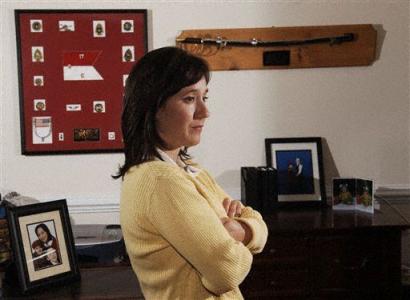War lives on long after the last clods of dirt turn over a soldier's grave.
It hangs from the faces of husbands and wives — mostly wives — whose lives
crumble after foreign horrors take their spouses.

Kimberly Hazelgrove, who lost her husband,
Chief Warrant Officer Brian D. Hazelgrove, in a helicopter crash near
Mosul in January 2004, stands in her Lorton, Va., home on Tuesday, April
18, 2006. Hazelgrove knew exactly why officers in dress uniforms came to
her door. It was a reality of a soldier's life at war, one she and her
husband both recognized before he deployed to Iraq with the Army's 10th
Mountain Division. [AP] |
Those who lost husbands early have been living their grief, raising children
without fathers and building futures with memories of hard men who turned soft
with children.
For those recently widowed, grief chokes out the hope.
Here are sketches of some of the wives whose soldier husbands were killed in
Iraq, and the complex changes they felt after hearing simple words — "Ma'am, we
regret to inform you ..."
___
Kathy Kennedy stopped crying for her husband on the anniversary of his death.
Surrounded by friends at a backyard campfire she held one year after his
helicopter was shot down near Tikrit, they exchanged stories, told jokes and
laughed.
At that moment, things felt different for the first time since his death.
"I felt, 'we made it through a year, we're going to make it again,'" she says
now, two and a half years after the death of her husband, Chief Warrant Officer
Kyran E. Kennedy, 43, of Boston.
Kennedy, a pilot in the 101st Airborne Division's aviation brigade, was
flying a Black Hawk over Tikrit in November 2003 when he was shot down. Three
others died in the crash.
The years since have brought a purpose to life with her two children, she
said, even if it's only to remember the man she married and loved and pass on
those memories to his children who barely knew him.
Her oldest son, Christopher, then 11, told her quietly in the moments after
they learned the news that they would have to remember his father for the
youngest boy in the family, who was too young to remember anything.
Even with pictures and stories, there are challenges.
When Kevin, now 6, reminisces with the family, he contributes memories of
hunting outings with his father that never happened. He recalls with vivid
clarity scuba diving with his dad at a time when he could barely swim.
These are memories he would have had, and they will pass — just like her
tears have dried up in exchange for smiles through the years, Kennedy said.
Her family will find normalcy in unordinary circumstances. It will just take
time.
"We're not forever going to be that family whose husband was killed in Iraq,"
she said.